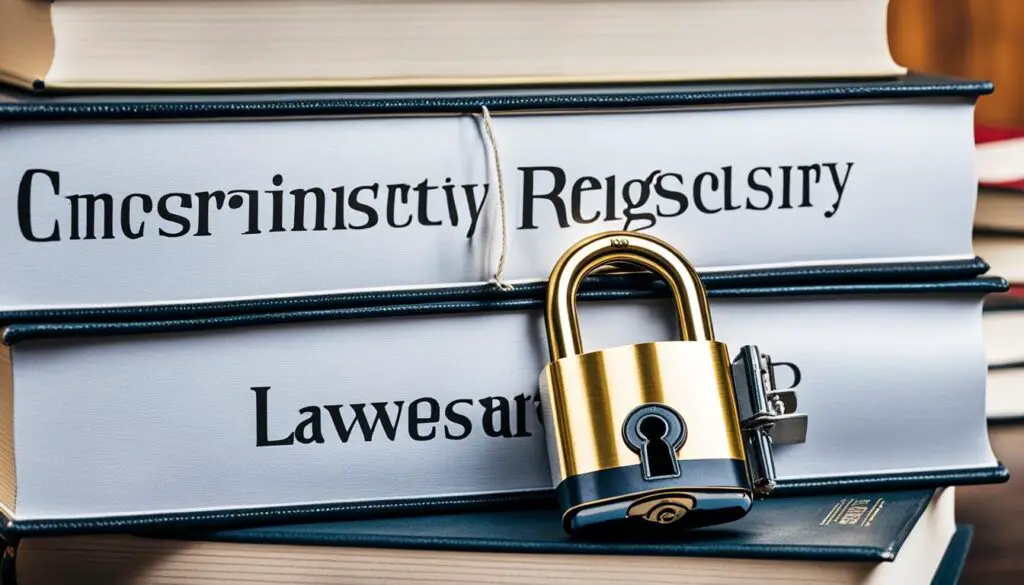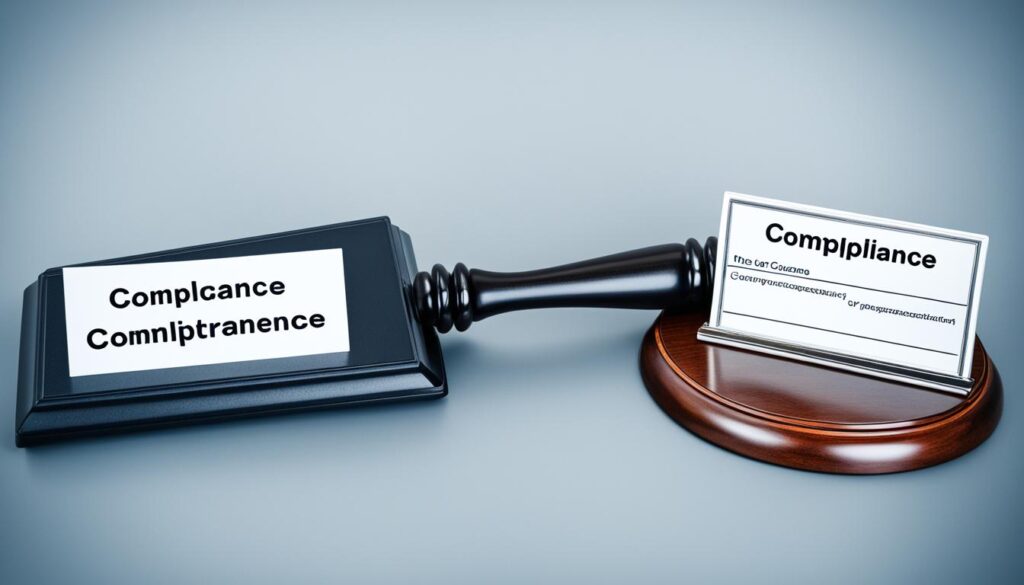
In today’s digital age, lawyers face a significant responsibility when it comes to protecting sensitive client data. With cybersecurity threats on the rise, understanding and adhering to cybersecurity regulations is crucial for legal professionals. Compliance with these regulations not only ensures the safety of client information but also protects lawyers from legal and reputational consequences.
As technology continues to evolve, so do the cybersecurity risks that lawyers encounter. From data breaches to cyber attacks, the consequences of non-compliance can be severe. To safeguard against these threats, lawyers must stay updated on the latest cybersecurity regulations and implement robust security measures.
There are various cybersecurity regulations that lawyers need to be aware of and follow. Regulations such as the General Data Protection Regulation (GDPR), the California Consumer Privacy Act (CCPA), and the Health Insurance Portability and Accountability Act (HIPAA) establish guidelines and standards for protecting client data. It is essential for lawyers to understand these regulations and ensure their compliance.
By prioritizing compliance with cybersecurity regulations, lawyers not only protect their clients’ sensitive information but also maintain trust and credibility. It is crucial to regularly review and update cybersecurity practices, stay informed about evolving regulations, and invest in continuous education and training.
Key Takeaways:
- Compliance with cybersecurity regulations is crucial for lawyers to protect sensitive client data.
- Understanding and adhering to cybersecurity regulations helps lawyers avoid legal and reputational consequences.
- Cybersecurity regulations provide guidelines and standards for lawyers to ensure data security.
- Regular training and awareness programs are essential for lawyers to stay updated on the latest cybersecurity regulations and best practices.
- By staying compliant with cybersecurity regulations, lawyers can mitigate potential risks and safeguard client data effectively.
The Importance of Compliance in Cybersecurity Regulations for Lawyers
Compliance with cybersecurity regulations is crucial for lawyers to protect sensitive client data. Understanding and adhering to cybersecurity regulations helps lawyers avoid legal and reputational consequences. Non-compliance can lead to data breaches and the loss of client trust.
Cybersecurity regulations provide guidelines and standards for cybersecurity practices that lawyers must follow to ensure data security.
Compliance with cybersecurity regulations helps lawyers stay ahead of emerging threats and protect against cyber attacks. Regular training and awareness programs are essential for lawyers to stay updated on the latest cybersecurity regulations and best practices.
Key Benefits of Compliance in Cybersecurity Regulations:
- Protection of Sensitive Client Data
- Avoidance of Legal and Reputational Consequences
- Mitigation of Data Breaches
- Preservation of Client Trust
- Staying Ahead of Emerging Threats
- Effective Cyber Attack Protection
- Continuous Education and Training Opportunities
By prioritizing compliance with cybersecurity regulations, lawyers can effectively safeguard sensitive client data, mitigate potential risks, and uphold the highest standards of data security and privacy.
Key Cybersecurity Regulations for Lawyers to Follow
As lawyers handling sensitive client data, it is crucial to adhere to key cybersecurity regulations to ensure data protection and maintain compliance. Below are some of the most important cybersecurity regulations that lawyers must follow:
General Data Protection Regulation (GDPR)
The GDPR, implemented in 2018, is a comprehensive data protection regulation that applies to all individuals and organizations handling personal data of EU citizens. Lawyers must protect personal data and obtain consent for data processing in accordance with the GDPR.
California Consumer Privacy Act (CCPA)
The CCPA grants California consumers rights over their personal information and imposes obligations on businesses that collect, use, and disclose consumer data. Lawyers must provide privacy policies and notices in compliance with the CCPA.
Health Insurance Portability and Accountability Act (HIPAA)
HIPAA establishes rules for the protection of individually identifiable health information and applies to lawyers handling healthcare data. Lawyers must ensure the confidentiality, integrity, and availability of protected health information.
Gramm-Leach-Bliley Act (GLBA)
The GLBA applies to lawyers in the financial sector and requires the protection of consumer financial information. Lawyers must implement safeguards to secure sensitive financial data and protect the privacy of their clients.
New York State Department of Financial Services (NYDFS) Cybersecurity Regulation
The NYDFS Cybersecurity Regulation imposes cybersecurity requirements on lawyers operating in New York. It includes provisions for data encryption, multi-factor authentication, and incident response planning.
National Institute of Standards and Technology (NIST) Cybersecurity Framework
The NIST Cybersecurity Framework provides guidelines and best practices for lawyers to manage cybersecurity risks effectively. It helps lawyers assess their current cybersecurity posture and establish robust security measures.
Overview of Key Cybersecurity Regulations for Lawyers
| Regulation | Description | Applicability |
|---|---|---|
| GDPR | Protects personal data and requires consent for processing | All individuals and organizations handling EU citizen data |
| CCPA | Grants consumer rights over personal information | Lawyers operating in California |
| HIPAA | Rules for protecting health information | Lawyers handling healthcare data |
| GLBA | Requires protection of consumer financial information | Lawyers in the financial sector |
| NYDFS Cybersecurity Regulation | Imposes cybersecurity requirements | Lawyers operating in New York |
| NIST Cybersecurity Framework | Provides guidelines and best practices | All lawyers for managing cybersecurity risks |
Complying with these cybersecurity regulations is essential for lawyers to ensure data protection, maintain client trust, and mitigate the risks of cyber threats. By following these regulations and implementing robust cybersecurity practices, lawyers can effectively safeguard sensitive client data and demonstrate their commitment to compliance.
Conclusion
Compliance with cybersecurity regulations is of utmost importance for lawyers in order to protect sensitive client data. By prioritizing cybersecurity compliance, lawyers can ensure the security and confidentiality of client information, maintaining trust and credibility with their clients.
Regular reviews and updates of cybersecurity practices and policies are necessary to stay in line with evolving regulations. This ongoing effort ensures that lawyers remain compliant and are able to adapt to emerging cybersecurity threats.
Continuous education and training on cybersecurity best practices are essential for lawyers to stay current with regulatory requirements. By staying informed and up to date, lawyers can effectively implement robust cybersecurity measures, reducing the risk of data breaches and cyber attacks.
By adhering to cybersecurity regulations, lawyers can mitigate potential risks and effectively safeguard client data. Protection of client information is not only a legal obligation but also a crucial aspect of maintaining a strong professional reputation and building long-lasting client relationships.
FAQ
Why is compliance with cybersecurity regulations important for lawyers?
Compliance with cybersecurity regulations is crucial for lawyers to protect sensitive client data and avoid legal and reputational consequences. Non-compliance can lead to data breaches and the loss of client trust.
What are some cybersecurity regulations that lawyers must follow?
Some key cybersecurity regulations for lawyers include the General Data Protection Regulation (GDPR), the California Consumer Privacy Act (CCPA), the Health Insurance Portability and Accountability Act (HIPAA), the Gramm-Leach-Bliley Act (GLBA), the New York State Department of Financial Services (NYDFS) Cybersecurity Regulation, and the National Institute of Standards and Technology (NIST) Cybersecurity Framework.
How can lawyers ensure compliance with cybersecurity regulations?
Lawyers can ensure compliance with cybersecurity regulations by prioritizing data security, regularly reviewing and updating cybersecurity practices and policies, staying informed about the latest regulations and best practices, and providing ongoing training and education for themselves and their staff.
Why should lawyers prioritize compliance with cybersecurity regulations?
Lawyers should prioritize compliance with cybersecurity regulations to protect sensitive client data, maintain trust with clients, mitigate potential risks, and safeguard against cyber attacks and data breaches.
What are the consequences of non-compliance with cybersecurity regulations?
Non-compliance with cybersecurity regulations can result in legal and reputational consequences, data breaches, loss of client trust, financial penalties, and damage to the firm’s reputation.
How can lawyers stay updated on the latest cybersecurity regulations?
Lawyers can stay updated on the latest cybersecurity regulations by regularly monitoring legal and industry news, participating in professional organizations and conferences, engaging in continuous education and training programs, and seeking guidance from cybersecurity experts and legal professionals specializing in data protection.
Are there specific cybersecurity regulations for lawyers operating in New York?
Yes, lawyers operating in New York are subject to the New York State Department of Financial Services (NYDFS) Cybersecurity Regulation, which imposes specific cybersecurity requirements to protect client data and ensure data security in the financial sector.










